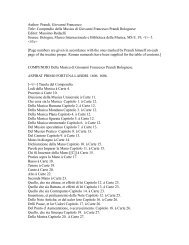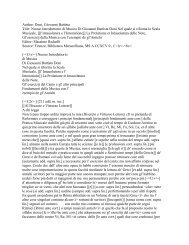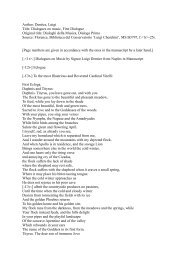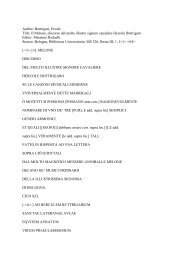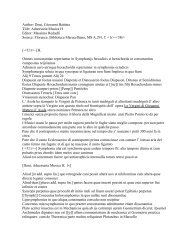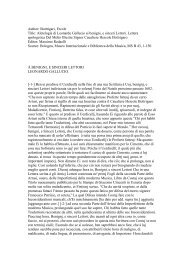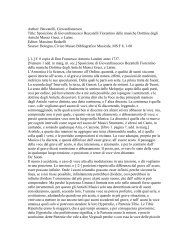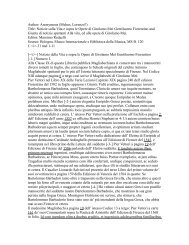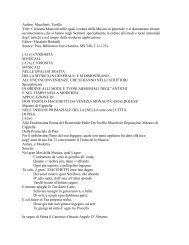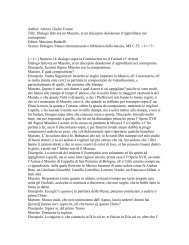Author: Doni, Giovanni Battista - manuscripts of italian music theory ...
Author: Doni, Giovanni Battista - manuscripts of italian music theory ...
Author: Doni, Giovanni Battista - manuscripts of italian music theory ...
You also want an ePaper? Increase the reach of your titles
YUMPU automatically turns print PDFs into web optimized ePapers that Google loves.
Enharmonic genus and considered it a mere fantasy, since they did not believe that the<br />
Diesis was applicable and useful. However, one must note most <strong>of</strong> all the argument<br />
adduced by them against the use <strong>of</strong> the diesis, which is that it could not be found<br />
through any consonance, since it is not the difference between two consonances, as in<br />
the case <strong>of</strong> the tone, which is the interval by which the fourth exceeds the Ditone.<br />
From this one can notice that the consonances which are called imperfect were known<br />
very well at that time, although it is common believed that the opposite is true.<br />
[--] Why the last two genera were lost, and who set out to restore them Chapter<br />
Apart from the succession <strong>of</strong> events in human history which renders variable and<br />
changeable all the parts <strong>of</strong> nature as well the inventions <strong>of</strong> man, it appears that the<br />
cause <strong>of</strong> the loss <strong>of</strong> the two genera may be ascribed principally to those two great<br />
revolutions and falls <strong>of</strong> the two last Empires, namely, the Greek and the Roman,<br />
which were destroyed and ruined to such an extent by the barbarians together with<br />
what <strong>of</strong> good and beautiful was contained in them, that even the most necessary arts<br />
were either lost or were very lacking and the world was enveloped for many centuries<br />
in the greatest ignorance, so that both for this reason as well because <strong>of</strong> the laziness<br />
and sloth <strong>of</strong> those who could have taken on this discipline, had they wanted to labour<br />
on it, one can believe that, since even their writers on those subjects were lost with the<br />
passing <strong>of</strong> time and since the world fell into greater disarray than before, even the<br />
memory <strong>of</strong> them was lost. Hence, just as the Enharmonic came to light later than the<br />
others, thus it also vanished earlier. One can find the main reason for this in its<br />
complexity, because, as we have seen, this genus requires great study and continuous<br />
practice on the part <strong>of</strong> the singers. Hence, since <strong>music</strong> was not highly regarded even<br />
by the Romans and since its practitioners were not as well regarded as by the Greeks,<br />
and since singing and playing competitions were as commonplace in public festivals,<br />
as this must have been a great incentive for those aspiring to great glory, it is not<br />
surprising that such a great genus was lost. Besides, we know that it is less pleasing<br />
and more convoluted than the others. In fact, since the first two intervals are so small<br />
that the experts <strong>of</strong> the art and those endowed with a refined ear are able to distinguish<br />
them with difficulty, [--] it could not, nor it can now please simple people who<br />
are more numerous than the experts. Hence, it seems to the majority that such <strong>music</strong><br />
is poorer and composed <strong>of</strong> fewer intervals, since they take the first two almost as a<br />
single one and hardly distinguishing the second not from the third one. Moreover, that<br />
leap <strong>of</strong> an uncompounded third, if it used <strong>of</strong>ten, will bore inexperienced listeners,<br />
since it will make it look as if the melody lacks the middle note which divides it in the<br />
diatonic. Besides, since everyone appreciates more the type <strong>of</strong> <strong>music</strong> which is closer<br />
to its attitude, and, since persons belonging to the lower class and who indulge in<br />
carnal desires, have a lower character, as Aristotle points out<br />
, they will<br />
not appreciate such an interval which has something <strong>of</strong> the magnificent and <strong>of</strong> the<br />
Heroic, since the <strong>music</strong> which employ frequently such large intervals are apt to<br />
express the magnanimous and magnificent character, which, therefore, is suited to<br />
tragedy, as Greek Writers note. Therefore, le it be without question that since [This is<br />
confirmed by Macrobius in his Somnium Schipionis, book 3, Chapter 4, where he<br />
says that “it was abandoned because <strong>of</strong> its excessive difficulty” in marg.] the<br />
Enharmonic genus had this character, it was lost, and that the Chromatic, albeit it was<br />
sweet and cheerful, nevertheless, since it was harder than the Diatonic and required a<br />
considerable amount <strong>of</strong> application, was also abandoned many centuries ago. [This is<br />
the reason why it was abandoned, rather than one reported by Ponto da Tiard in his



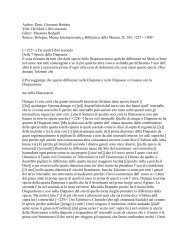
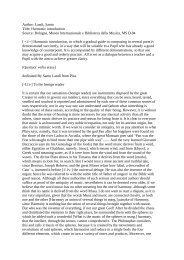
![Doni, Giovanni Battista Title: Trattato Dei Tuoni o [[Harmonie de]]](https://img.yumpu.com/45461005/1/190x245/doni-giovanni-battista-title-trattato-dei-tuoni-o-harmonie-de.jpg?quality=85)
